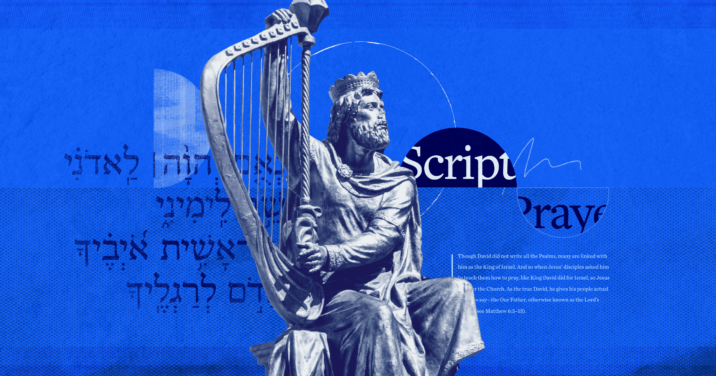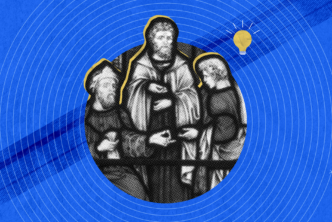Over the past several decades, evangelicals have increasingly accepted written (i.e., scripted) prayers from liturgical traditions. This reception is partly due to the influence of the ecumenical movement of the twentieth century, partly due to their perceived novelty, but also partly because evangelicals are rediscovering the real value of scripted prayers.
Yet for evangelicals, the question naturally arises: Does the Bible support the use of written prayers, or must prayers always be extemporaneous?
I want to argue that the Bible’s own theology of prayer should lead us to honor both scripted prayer and extemporaneous prayer. Rather than claiming that written prayer is preferred over extemporaneous prayer, my claim is more simply that scripted prayer is foundational to all prayer—including extemporaneous prayer.
In short, scripted prayer serves to elicit extemporaneous prayer in the hearts of all God’s people. Written prayers train our hearts to call on God’s name through the gospel (John Calvin, Institutes 3.20.1) so that in the end, all prayer, be it prewritten or extemporaneous, entails simply asking God to deliver on what he has already promised, as he has provided it to us in his inspired scripts.
Table of contents
- But what does the Bible say?
- Are written prayers vain repetition?
- Our reformational heritage
- The Psalms and lyrical prayer
- Jesus’s own scripted piety
- The Psalms as Christian prayers
- Jesus, a king who leads us in prayer
- The apostolic pattern: “ the prayers”
- Spirit-guided prayers of the church
- Learning our scripts
But what does the Bible say?
Given evangelicals’ commitment to the authority of Scripture for faith and practice, a hallmark of evangelicalism is its concern for the biblical foundations for our convictions and practices1—especially worship, including the prayers we use in it.
Yet this search for such biblical foundations does not always result in a single united find—like finally locating Waldo. For instance, although the Protestant Reformation’s formal (bedrock) principal was the criteria, “What does the Bible say?” even the most ardent defenders of sola Scriptura did not always agree on what the Bible has to say on a given subject.
This is no less true for written prayers. One can go as far back to the Act of Uniformity (1662) in England to see that those who took Scripture as their ultimate authority, like Anglicans, believed scripted prayers were supported by Scripture. On the other hand, the Puritans preferred prison to praying scripted prayers because they did not believe the Bible permitted them.
Luminaries as significant as John Owen and John Bunyan saw real prayer as chiefly inward, unscripted, and as an affectionate pouring out of the heart and calling on the name of Yahweh through the gospel. They argued this based on Scripture. Scripted prayer, they believed, violated the regulative principle of worship, was a return to the old covenant, and quenched the Spirit. They argued such things from Scripture.
These differences in interpretation lead us to ask, “What does the Bible actual say about written prayers?”
Are written prayers vain repetition?
Perhaps one of the chief arguments against written prayer comes from Jesus’s teaching in Matthew 6:
And when you pray, do not heap up empty phrases as the Gentiles do, for they think that they will be heard for their many words. Do not be like them, for your Father knows what you need before you ask him. (Matt 6:7–8)2
Are written prayers a violation of this teaching? Does using written prayers involve the very activity Jesus evidently condemns; namely, repeating our prayers?
A closer look at what Jesus teaches here shows why this is not the case. First, we know Jesus is not against repetition because repeating prayer is immediately encouraged by Jesus in the larger context of the Sermon on the Mount in Matthew 7:7–8 (see the parallel in Luke 11:9–10):
Ask, and it will be given to you; seek, and you will find; knock, and it will be opened to you. For everyone who asks receives, and the one who seeks finds, and to the one who knocks it will be opened.
The Lukan account of this triplet of “ask, seek, knock” (Luke 11:9–10) has a parabolic analogue in Luke 11, which dramatically captures one friend visiting another who literally keeps asking, seeking, and knocking until his friend provides what he needs (Luke 11:11–12). Chapters later, the parable of the persistent widow in Luke 18:1–8 shows that the same request offered over and over will eventually be answered. Jesus we see is adamantly for repetition!
We are heard not because we prayed the right words but because Jesus’s Father is the God who hears the cries of his people.
Second, an interpretive key in Matthew 6 is Christ’s reference to the gentiles, which is the type of prayer he condemns. A clear example of gentile prayer is found in 1 Kings 18 where the prophets of Baal are found dancing around the altar, shouting and repeating mantras, sacrificing animals, and cutting themselves hoping to be heard. This is the type of prayer Jesus has in mind in Matthew 6 because it relates to God through magic and manipulation and fails to recognize that our God knows what we need even before we ask (Matt 6:8). We are heard not because we prayed the right words but because Jesus’s Father is the God who hears the cries of his people, and by being in covenant with them has promised to never leave them or forsake them (Deut 31:6; Josh 1:5).
Repetition, such as repeating the words of written prayers, is not about saying the right words in order to “manipulate” God, but it is about training the heart to rightly engage God with persistence. Written prayer, in this sense, has the potential to become the soil in which free prayer grows, which evangelicals historically should have great esteem for.
Our reformational heritage
The majority of English-speaking Christians take for granted the galvanizing influence that scripted prayer has had on Christianity in the West.
Prior to the Reformation, clergy and laity relied exclusively on missals and breviaries that contained written prayers in Latin. The laity depended on clergy and only received what the clergy gave them, which was prayer not in their native tongue. Foreign speech concealed foreign doctrines that the Scriptures did not teach, hence the movement known as the Protestant Reformation.
Thus when Thomas Cranmer wrote the Book of Common Prayer, he was not only giving the people of God their first book of prayers in their language, he was also rooting their prayers in Scripture. Doctrine and devotion were being reunited and reformed according to Holy Scripture.
This reunion and reformation of doctrine and devotion was based on the retrieval of a principle from the fifth century. In the works of a disciple of Augustine of Hippo named Prosper of Aquitaine, we find the Latin phrase, Lex orandi, lex credendi—“the law of what is prayed is the law of what is believed.” While this principle has deeply influenced much of the Christian tradition throughout church history, it has sadly had little affect on American Christianity. In essence, this principle teaches that prayer and belief should be integral to each other, which is why scripted prayer is a form of theology in itself, as it seeks to align the heart and the mind with the truths of Holy Scripture.
For example, if you study the scripted prayers of the Book of Common Prayer, you will see that they are so rich in biblical theology that as you pray these prayers, you will be praying Scripture. Scholars have frequently noted that all of the prayers in the Book of Common Prayer are either direct quotations of Scripture or indirect reflections on Scripture. This is why J. I. Packer is said to have defined scripted prayers as “the Bible arranged for worship.” Scripted in this sense just means Scripture put in the language of the heart.
The Psalms and lyrical prayer
Perhaps the clearest evidence of scripted prayer are the Psalms themselves.
The Psalter is the largest book of the Bible. It is a collection of written prayers gathered for Israel explicitly intended for corporate prayer. Many times the Psalms begin with prefaces that include comments, such as:
- “To the choirmaster”
- “With stringed instruments”
- “For the flutes”
- “To the tune of the lilies”
- “According to the Sheminith,” “the Gittith,” or “the Muth-Laben”
These notes are often completely overlooked, but they are liturgical instructions for the one leading the assembly of the gathered saints in praying a particular Psalm according to a particular tune, for a particular occasion, time of day, or season. These instructions, in other words, show us that the Psalms were prayer scripts for gathered worship that were to be followed.
Augustine allegedly said, “he who sings prays twice.” This instinct to inhabit singing as prayer is the spirit of the Psalter and is why in more liturgical traditions there is distinction but not a difference in praying and singing. So when the Psalmist says, “Sing to the Lord a new song” (Ps 96:1 NIV), he is saying put your own prayers to music and let them be “the prayers” of the people.
Theologically trained musicians rightly note that all Christian hymnody is really written prayer for the church. Thus, even modern worship with its high value on spontaneous prayer cannot get away from scripted prayer when it sings its favorite worship songs.
Jesus’s own scripted piety
We have clear evidence from the New Testament that Jesus lived in the Psalms and knew these written prayers by heart (see table below).
|
Psalm |
Jesus’s use |
|
Ps 6:8 |
Matt 7:23; 25:41 |
|
Ps 8:2 |
Matt 21:16 |
|
Ps 22:1 |
Matt 27:46 |
|
Ps 31:5 |
Luke 23:46 |
|
Ps 37:11 |
Matt 5:5 |
|
Ps 41:9 |
John 13:18 |
|
Ps 69:21 |
John 19:28 |
|
Ps 82:6 |
John 10:34 |
|
Ps 110:1 |
Matt 22:44; Mark 12:36; Luke 20:42–43 |
|
Ps 118:22–23 |
Matt 21:42; Mark 12:10; Luke 20:17 |
|
Ps 118:26 |
Matt 23:39; Luke 13:35; |

Use Logos’s New Testament Use of the Old Testament Interactive to locate each of Jesus’s use of the Psalms.
In other words, the piety of Jesus we have from the Psalms was a scripted piety.
This does not mean that Jesus only ever prayed the Psalms. It simply means that Jesus relied on and was formed by these scripted prayers to such an extent that they shaped his own identity and life with God. On many occasions, we read in the New Testament that Jesus departed to be by himself with his Father in private prayer (Matt 14:13; 14:23; Mark 1:35; 6:46; 14:32; Luke 6:12–13). We do not know what he prayed in those moments, except in those instances where his disciples were close enough to hear him (e.g., Mark 14:36). But we might imagine these moments of solitude as involving more intimate, inward, unscripted, and affectionate pouring out of the heart and calling on the name of Yahweh—the type of prayer that Owen and Bunyan valued. The Psalms were the scripts Jesus prayed that informed and gave rise to these extemporaneous prayers.
The Psalms as Christian prayers
But beyond Jesus’s own use of the Psalms, we also observe Jesus claiming that the Psalms are actually about him. Jesus says in Luke 24:44, “These are my words that I spoke to you while I was still with you, that everything written about me in the Law of Moses and the Prophets and the Psalms must be fulfilled. Then he opened their minds to understand the Scriptures” (emphasis added). Furthermore, he tells the Pharisees in John 5:39 that they are searching the Scriptures, such as the Psalms, in vain if they are not finding Christ in them.
The hermeneutical cash out here is vitally significant. The Psalms serve as the silhouette of Christ and so our engagement with them is engagement with Christ.
This means that, as Christ-centered scripted prayer, the Psalms’s prayers remain relevant for us today. In fact, as fulfilled in Christ, they are even more our prayers than they were for any old covenant believer. This is why still in some traditions the Psalms are said, sung, or chanted every time God’s new covenant people gather.
Jesus, a king who leads us in prayer
But the Psalter not only provides us written prayers. It also teaches, or models for us, how to pray—a function Jesus likewise fulfills.
Though David did not write all the Psalms, many are linked with him as the king of Israel. And so when Jesus’s disciples asked him to teach them how to pray, like King David did for Israel, so Jesus does for the church: “Pray then like this …” (Matt 6:9). In keeping with the Psalms, Jesus, the true David, gives his people actual words to say—the Our Father, otherwise known as the Lord’s Prayer (see Matt 6:5–13).
When Jesus’s disciples asked him to teach them how to pray, like King David did for Israel, so Jesus does for the church.
This scripted prayer is so simple that many children come to know it by heart, yet so deep that entire catechism classes are based on its content. It’s a scripted prayer to be prayed and it’s a scripted prayer that teaches us how to pray.
The apostolic pattern: “the prayers”
Corroborating this practice of Jesus, we can see this same scripted piety continuing into in the earliest days of his followers, the church. It’s interesting to note that in Acts 2:42 the early church was devoted to four things:
- the apostles’ teaching
- the fellowship
- the breaking of bread
- the prayers
The definite article (“the”) before each of these is significant. This seems to suggests that Luke intends to emphasize particular teaching, fellowship, breaking of bread, and prayers (e.g., not just “prayers” but “the prayers”).3 This seems to suggest that the early church was devoted to particular established prayers.
Perhaps in the same vein of Israel in the temple, might the early church have continued to pray the Psalms as Christian prayers in the the eucharistic assembly? It’s not without reason, then, that many traditions passionately recite, sing, or chant the Psalms every time God’s new covenant people gather.
At the very least we can imagine the church’s devotion to “the prayers” as involving the use of scripted prayers, making such a practice faithful to Scripture and not a departure from it.
Spirit-guided prayers of the church
This use of scripted prayer, though, points us to perhaps the greatest gift Jesus gave us: the Holy Spirit of prayer. The Spirit not only prays for us when we do not have the words to pray (Rom 8:26), but the Spirit is both the answer to prayer (Luke 11:13) and more amazingly the giver of actual words to pray (John 16:14–15).
In the upper room on his final night, Jesus envisions the Spirit as his very own presence with us upon his departure (John 14–16), and he sanctions the very prayers we utter in his name. In John 14:12–14, Jesus says, “Truly, truly, I say to you, whoever believes in me will also do the works that I do; and greater works than these will he do, because I am going to the Father. Whatever you ask in my name, this I will do, that the Father may be glorified in the Son. If you ask me anything in my name, I will do it.”
Thus, when the church faithfully crafts prayers for the people of God, in the Spirit, according to Scripture and in Jesus’s name, we are to receive these prayers as the “fruit of the Spirit’s teaching activity from the ages as God’s people have sought understanding of Scripture.”4
Learning our scripts
So we return to our original question: What does the Bible say? Might there be something in the way of propriety to learn from its testimony? Yes.
Does this suggest that all written prayers have sanctioned status? Not at all. Written prayers are “not infallible, but neither [are they] negligible, and we impoverish ourselves if we disregard [them].”5
Recommended resources from Bedell
The Book of Common Prayer by Anglican House Publishers
Teach Us to Pray: The Lord’s Prayer, Catechesis, and Ritual Reform in the Sixteenth Century
Regular price: $111.00
Related articles
- Transform Your Prayer Life: 11 Essential Books on Prayer
- 8 Ancient Prayers of Confession to Adopt as Our Own
- It’s Not Magic: Understanding the Power & Pattern of Prayer
- David Bebbington succinctly captured the movement of evangelicalism with four emphases known as the Bebbington Quadrilateral: (1) Bible, (2) cross, (3) conversion, and (4) activism. With the Bible as primary, Bebbington observed that for evangelicals all essential spiritual truths must be found in its pages.
- Unless otherwise indicated, all quotations of Scripture are from the ESV.
- As David Peterson notes with relation to prayer, “The plural form with the article in Greek suggests that the reference is to specific ‘prayers’ (KJV, NRSV, ESV) rather than to prayer in general (TNIV to prayer). In the context, this most obviously points to their continuing participation in the set times of prayer at the temple (cf. 3:1 note).” David G. Peterson, The Acts of the Apostles, Pillar New Testament Commentary (Eerdmans, 2009), 162.
- J. I. Packer, “Upholding the Unity of Scripture Today,” JETS 25 (1982): 414.
- Packer, “Upholding the Unity of Scripture Today,” 414.





